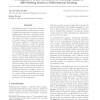Free Online Productivity Tools
i2Speak
i2Symbol
i2OCR
iTex2Img
iWeb2Print
iWeb2Shot
i2Type
iPdf2Split
iPdf2Merge
i2Bopomofo
i2Arabic
i2Style
i2Image
i2PDF
iLatex2Rtf
Sci2ools
ICML
2004
IEEE
2004
IEEE
A comparative study on methods for reducing myopia of hill-climbing search in multirelational learning
Hill-climbing search is the most commonly used search algorithm in ILP systems because it permits the generation of theories in short running times. However, a well known drawback of this greedy search strategy is its myopia. Macro-operators (or macros for short), a recently proposed technique to reduce the search space explored by exhaustive search, can also be argued to reduce the myopia of hill-climbing search by automatically performing a variable-depth look-ahead in the search space. Surprisingly, macros have not been employed in a greedy learner. In this paper, we integrate macros into a hill-climbing learner. In a detailed comparative study in several domains, we show that indeed a hillclimbing learner using macros performs significantly better than current state-of-the-art systems involving other techniques for reducing myopia, such as fixed-depth look-ahead, template-based look-ahead, beam-search, or determinate literals. In addition, macros, in contrast to some of the other ...
| Added | 17 Nov 2009 |
| Updated | 17 Nov 2009 |
| Type | Conference |
| Year | 2004 |
| Where | ICML |
| Authors | Lourdes Peña Castillo, Stefan Wrobel |
Comments (0)

